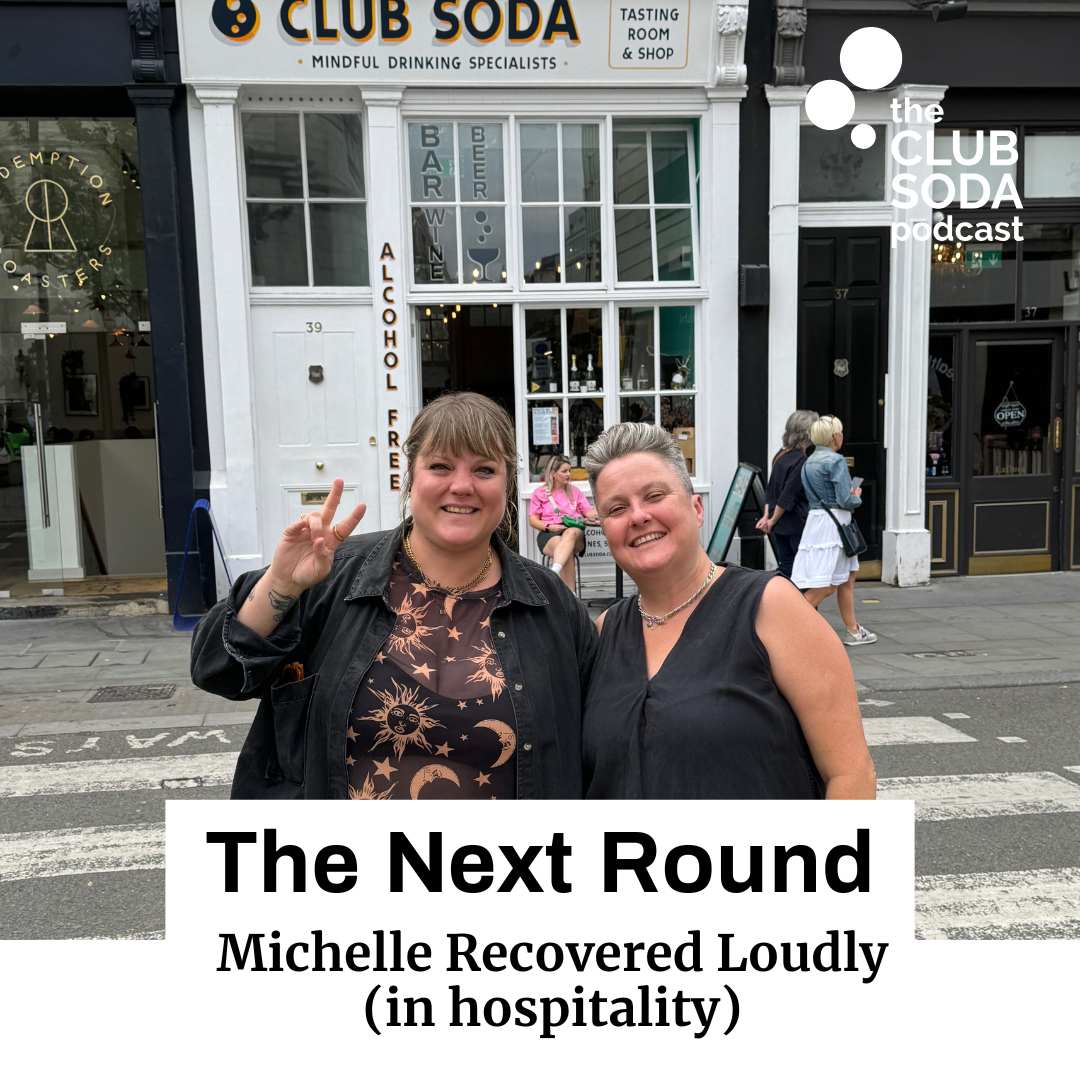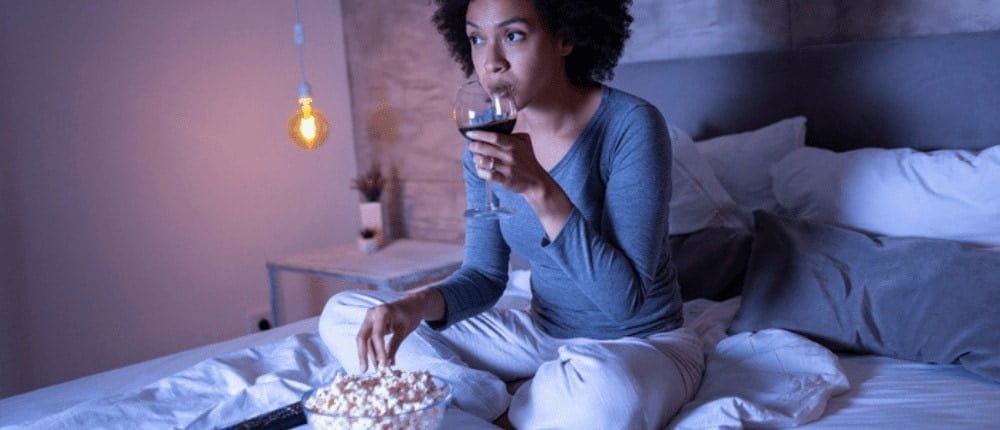
This website uses cookies to improve your experience. We'll assume you're ok with this, but you can opt-out if you wish. Read More
The Next Round: What happens after you change your drinking?

As we approach Christmas, with its lure of cosy festive get-togethers with family and friends, it seems an apt time to talk about why we drink at home. This is a time of year where we often find that we’re preoccupied with alcohol – after all, we’re told to eat, drink, and be merry. Alcohol’s overwhelming presence in our minds and in our fridges can feel like an inevitability that we can’t avoid. The habit of having a drink in our most familiar surroundings can become uncomfortable, even problematic if we’re trying to change our drinking, especially if the pandemic has turned us into a home drinker rather than a social one.
During our Global Mindful Drinking Festival, we asked a panel of mindful drinking experts to discuss their experiences of home drinking. Led by Alcohol Change UK Chief Executive, Richard Piper, the panel talked through 7 reasons why we drink at home, and what we can do about it if it’s a problem.
This summing up of the 7 key reasons why we drink at home is really useful you know and a great sense-check if we think our drinking at home may be getting out of hand. This handy list, taken from the panel discussion How to Stop Drinking at Home, which you can still listen to as a podcast episode, will help to fine-tune your at home drinking habits.
I didn’t go to the pub very often. It’s more expensive. I get much more for much more booze for my buck if I drank at home.
Ian Bilik, Club Soda member & sober blogger
Even as the Chancellor announces tax cuts for beer and wine, the price of buying your favourite tipple at your local pub has gone up exponentially in recent years years. With rising costs for pub owners being pushed onto the customers, it’s been cheaper to drink at home. Pre-drinking – that is, drinking before going out – has turned some of us into home drinkers simply because we can’t afford a night out on the town. It’s possible that we’re now consuming more than we had intended to before leaving the house due to the price of buying alcohol.
I really felt like I was on this treadmill where every single day I invented reason to drink. And it just became my pattern. And then I drank because I was hungover… there was always some reason. But yeah, basically, stress was a big trigger for me and my drinking.
Lateef Joseph-Maynard, owner of The Wagon alcohol-free pop up cocktail bar
With the pandemic still present in our lives, we’re more likely to be drinking at home now more than ever. Firstly, the COVID restrictions that came into place 18 months ago stopped us from going to the pub with our friends. Now, after months at a time spent indoors in comfortable clothes tucking into takeaways during multiple lockdowns, many of us are suffering from HOGO – the hassle of going out.
Social anxiety due to the pandemic means that difference between the kind of habits that we have at home and the kind of habits that we have when out with friends became palpably different. People’s drinking became really polarized during the lockdown, where some turned away from drinking altogether. But for people who drink at home to deal with stress and anxiety, our drinking could have skyrocketed.
Alcohol slowly started to take its toll on me, I began to feel really crappy about myself…I had a breakdown because I was just working really hard and living on alcohol and caffeine and whatnot. And as I built myself back up, stopping drinking was part of that process for me.
Emma Gilmore, counselor psychotherapist
If we have pre-existing mental health problems, having a drink at home can be a way of self-medicating. We may choose to drink in a private space in order to numb overwhelming feelings of pain and sadness. Drinking can be a secondary problem, and it’s always best to seek medical advice if you have poor mental health. But also remember that alcohol can induce anxiety and depression, and addressing excessive drinking can help you to assess what you need to do to help your mental health.
1 in 4 people suffer from mental health conditions. If you are struggling, remember that you’re not alone. Seek the help of a professional or contact The Samaritans if you need to talk to someone urgently.
Being able to escape the human experience has been something that all of our ancestors have done in every human society ever. And I think it’s kind of okay, occasionally, for us to lose ourselves. The problem is when that becomes your default, the problem is when that becomes your main way of operating.
Richard Piper, Alcohol Change UK
Escapism, more often than not, links back to anxiety and stress. Using any substance to escape from painful, stressful, and overwhelming situations is detrimental to our self-care. Finding other ways to deal with pressure when trying not to drink at home can be a powerful way of creating change. Here is Club Soda’s list of things to do to take your mind off things that don’t involve drinking at home.
Alcohol becomes our treat at the end of the day. It’s okay to still have a treat at the end of the day…that marking a change in time, changing pace is actually okay. But you can do that with a hot chocolate or CBT or you could do with an alcohol-free beer.
Laura Willoughby, founder of Club Soda
Alcohol can be a quick and easy reward. Had a long week? Spent time doing something difficult? Achieved something great? Then surely we deserve a ‘treat’. As Lateef points out, we’re told that positive events – celebrations, weddings, exam success, milestone birthdays – they are all celebrated with alcohol. Over time, we associate these positive events with alcohol. If we’ve celebrated positive milestones at home during lockdowns, then we’re likely to have used alcohol as a way of marking these moments. But this is a created association. As Richard deftly put it, ‘there’s nothing natural about this particular chemical substance and feeling good about yourself’.
Your identity is so entwined with booze. When you stop drinking, you think ‘Who the hell am I if I don’t drink? If I’m not the drinker?’ There’s a big journey there, isn’t there, finding what your identity is when you when you move from drinking or to more mindful drinking.
Emma Gilmore, counselor psychotherapist,
When something becomes a habit, it also starts to become a part of your every day and, subsequently, a part of who you are. If we find that having a drink at home in the evening becomes out of hand, and we’re trying to change that, it can be really difficult to see who we might be if we’re not playing the role of the drinker. Habitual drinking, especially in our safe space, can be really difficult to tackle. Our own Dru found that he had bought into the role of the at-home drinker, and chose to replace his booze with alcohol-free beer, instead.
For myself, my at-home drinking was actually just that that’s what I thought grownups did. I just completely took for granted that at home drinking was just part of life. And the big eye-opener for me was realizing that IT was going on, but then also just swapping out alcohol for alcohol-free drinks. And that transformed my home drinking completely.
Dru Jaeger, co-founder of Club Soda
There was this encouragement, this snowballing of all these mums, somewhere in the world, with Facebook group posts where everyone would like suddenly put a selfie of themselves with their glasses of wine. And I was just watching this and just thinking, ‘this doesn’t feel healthy’.
Laura Jerram, community activist
In Britain, we’re known for our drinking culture. In the same way that our personal identities can be tied to our drinking habits, we can also fall foul of societal identities, too. Here, Laura discusses her discomfort at the ‘Mummy Wine Time’ trend that she felt was fuelled by social media. We’ve often discussed how men feel pressured to drink, especially if they’re involved in sport or sporting occasions. Whether religious, familial, gender-specific or even political, it’s important to acknowledge our cultural influences as that can help us to identify stumbling blocks to change.
This conversation was also full of positive stories. All the panelists on the podcast episode had changed their drinking for the better and shared details of how they were able to accomplish their goals. Some key learnings were:
To listen to the podcast in full, visit our podcast page – we’ve recently started Season 3 after a short hiatus for our Global Mindful Drinking Festival. Catch up on all your favourite podcasting platforms, like Apple, Google and Spotify. Subscribe today and get all our latest news, interviews and drinks reviews.
The Club Soda podcast is available wherever you subscribe to podcasts. Find your platform here.
This website uses cookies to improve your experience. We'll assume you're ok with this, but you can opt-out if you wish. Read More
| Name | Domain | Purpose | Expiry | Type |
|---|---|---|---|---|
| wpl_user_preference | joinclubsoda.com | WP GDPR Cookie Consent Preferences. | 1 year | HTTP |
| PHPSESSID | www.tickettailor.com | PHP generic session cookie. | 55 years | HTTP |
| AWSALB | www.tickettailor.com | Amazon Web Services Load Balancer cookie. | 7 days | HTTP |
| YSC | youtube.com | YouTube session cookie. | 55 years | HTTP |
| Name | Domain | Purpose | Expiry | Type |
|---|---|---|---|---|
| VISITOR_INFO1_LIVE | youtube.com | YouTube cookie. | 6 months | HTTP |
| Name | Domain | Purpose | Expiry | Type |
|---|---|---|---|---|
| _ga | joinclubsoda.com | Google Universal Analytics long-time unique user tracking identifier. | 2 years | HTTP |
| sbjs_migrations | joinclubsoda.com | Sourcebuster tracking cookie | 55 years | HTTP |
| sbjs_current_add | joinclubsoda.com | Sourcebuster tracking cookie | 55 years | HTTP |
| sbjs_first_add | joinclubsoda.com | Sourcebuster tracking cookie | 55 years | HTTP |
| sbjs_current | joinclubsoda.com | Sourcebuster tracking cookie | 55 years | HTTP |
| sbjs_first | joinclubsoda.com | Sourcebuster tracking cookie | 55 years | HTTP |
| sbjs_udata | joinclubsoda.com | Sourcebuster tracking cookie | 55 years | HTTP |
| sbjs_session | joinclubsoda.com | SourceBuster Tracking session | Session | HTTP |
| Name | Domain | Purpose | Expiry | Type |
|---|---|---|---|---|
| mailchimp_landing_site | joinclubsoda.com | Mailchimp functional cookie | 28 days | HTTP |
| __cf_bm | tickettailor.com | Generic CloudFlare functional cookie. | Session | HTTP |
| NID | google.com | Google unique id for preferences. | 6 months | HTTP |
| Name | Domain | Purpose | Expiry | Type |
|---|---|---|---|---|
| _ga_10XZMT03ZM | joinclubsoda.com | --- | 2 years | --- |
| AWSALBCORS | www.tickettailor.com | --- | 7 days | --- |
| cf_clearance | tickettailor.com | --- | 1 year | --- |
| VISITOR_PRIVACY_METADATA | youtube.com | --- | 6 months | --- |
Join Club Soda for 10% off your first order of drinks for UK delivery. Plus get our latest news and special offers for members to choose better drinks, change your drinking and connect with others.
If you get an error message with this form, you can also sign up at eepurl.com/dl5hPn